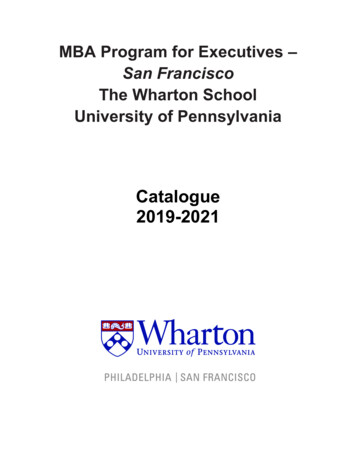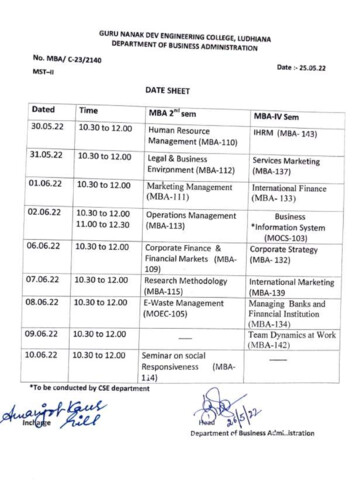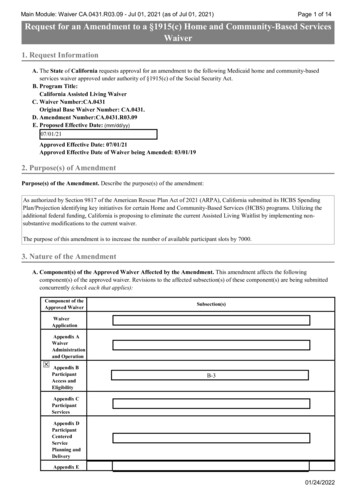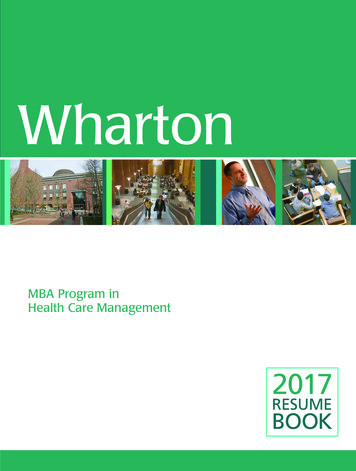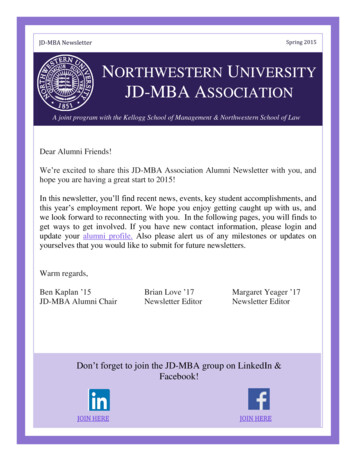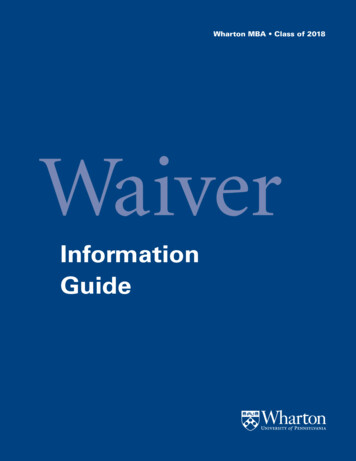
Transcription
Wharton MBA Class of 2018WaiverInformationGuide
Table of ContentsIntroduction .3Accounting (ACCT 611/612/613) .7Syllabus (ACCT 611) Fundamentals of Financial Accounting .11Course Outline (ACCT 611) Fundamentals of Financial Accounting .16Syllabus (ACCT 612) Accelerated Financial Accounting .21Course Outline (ACCT 612) Accelerated Financial Accounting .23Syllabus (ACCT 613) Fundamentals of Financial and Managerial Accounting .26Course Outline (ACCT 613) Fundamentals of Financial and Managerial Accounting .31Corporate Finance (FNCE 611/612).36Syllabus FNCE 611 .37Course Outline FNCE 611 .40Syllabus FNCE 604 .44Course Outline FNCE 604 .47Syllabus FNCE 612 .48Course Outline FNCE 612 .54Macroeconomics and the Global Economic Environment (FNCE 613/615) .56Syllabus-1 FNCE 613.57Course Outline-1 FNCE 613 .60Syllabus-2 FNCE 613.62Course Outline-2 FNCE 613 .64Syllabus-3 FNCE 613.66Course Outline-3 FNCE 613 .72Syllabus-4 FNCE 613.75Course Outline-4 FNCE 613 .77Syllabus FNCE 615 .80Course Outline FNCE 615 .82Economics of Managerial Decision Making (MGEC 611) .86Syllabus MGEC 611.87Course Outline MGEC 611.91Marketing Management: Program Design (MKTG 611) .95Syllabus MKTG 611.96Course Outline MKTG 611.100Marketing Management: Strategy (MKTG 612) .102Syllabus MKTG 612.104Course Outline MKTG 612.108Strategic Marketing Simulation (MKTG 613).109Syllabus MKTG 613.111Course Outline MKTG 613.113Regression Analysis for Business (STAT 613/621) .114Syllabus STAT 613 .116Course Outline STAT 613 .119Syllabus STAT 621 .122Course Outline STAT 621 .125
Introduction 3IntroductionThe Wharton MBA is designed to help you make the most of your academic experience. Formany, this is an opportunity to learn an entirely new skill set. For others, it is a chance to upgradeand update. Core WaiversYour class will experience a curriculum designed to meet the real-time needs of forward-thinkingbusiness leaders. This innovative curriculum builds a customizable foundation in businessessentials while providing ample time to explore Wharton’s wide array of elective offerings. TheCore Curriculum serves as the foundation for your business education. To learn more about theCore, please visit the MBA Inside website at mba-inside.wharton.upenn.edu/Taking the entire Core will not put you at a disadvantage. Nearly 40% of your class will not waive asingle course and many who do waive will waive only one subject. (See below for statistics onwaivers for the Class of 2017). Additionally, you have choices to make within the context of the Core,allowing you to tailor your educational experience even before registering for elective coursework.Waiver Statistics for the Class of 2017 612/613613621Waiver by Credential50-----96948-Waiver by Exam84-31-70112--101-Placement by Credential-35-130------Placement by 229701129627149336TotalNot Approved44591214232617676% Approved87%82%85%44%75%31%66%81%% of Class34%31%8%13%11%3%17%39%
Introduction 4 Waiver OptionsYou may have educational or professional experience that makes some of the material coveredin the Core redundant. Provided you can prove your mastery of such material by credential orexamination, you have the opportunity to waive related elements from the Core.This publication outlines each of the Core courses that may be waived and the requirements forwaiving. Enclosed you will find abridged syllabi for all of the courses that may be waived. If thecontent in one of these syllabi looks familiar, consider waiving that course.What Are Your Waiver Options?Course IDCourse TitleCredentialExamACCT 611/612Accounting * FNCE 611/612Corporate Finance † FNCE 613Macroeconomics and the Global Economic Environment MGEC 611Microeconomics for Managers: Foundations MKTG 611Marketing Management: Program Design MKTG 612/613Marketing Management: Strategy/Strategic Marketing Simulation STAT 613/621Regression Analysis for Managers ‡* Can place into Accelerated Financial Accounting by credential as well as waiving it by credential† Can place into Accelerated Corporate Finance by credential but not waive it altogether by credential‡ Can place into Accelerated Regression Analysis for Managers by exam only, not by credential How to WaiveYou will be asked to complete a waiver module on the MBA Inside website. Depending upon yourresponses, it may be recommended that you: Submit credentials verifying that you meet the waiver requirements; Take a waiver exam; or Take the class.If the waiver module recommends that you waive a particular course by credential, you will beprovided with instructions on how to submit the appropriate materials.Your application to waive by credential will be forwarded to a member of the faculty for review.If the module recommends that you take a waiver exam, please register for that exam through theMBA Inside website. The Waiver Exam Guide provides sample questions from several of thewaiver exams.
Introduction 5 Prep Coursework for ACCT, FNCE, and STATTUESDAY, AUGUST 2 – THURSDAY, AUGUST 4(Please note that these classes take place before the start of Pre-Term.)These ACCT, FNCE, and STAT classes are the only classroom review offered for waivers.Attendance is not required to take the waiver and placement exams but highly recommended.ACCT 604: This course is meant for students seeking placement into ACCT 612. ACCT 604 ismeant to help qualified students who may need to refresh their knowledge of basic financialaccounting concepts. It is not designed for students with little or no previous exposure toaccounting.ACCT 608: This course is designed for students who may be able to waive entirely the accountingrequirement but need to refresh their understanding of graduate-level financial accounting concepts. This course is not designed for students with only basic previous exposure to accounting.FNCE 604: This course is designed for students seeking placement into FNCE 612. FNCE 604 ismeant to help qualified students who may need to refresh their knowledge of basic corporatefinance concepts. It is not designed for students with little or no previous exposure to corporatefinance.STAT 608: This course is designed for students who wish to review the prerequisite materials forSTAT 621 to prepare for the placement exam. It is not designed for students with little or noprevious exposure to statistics. Should You Waive?Advantages include: Making room in your schedule for more elective coursework Not repeating coursework in areas in which you already have proficiencyThe disadvantages include: Missed oportunities to complete course work that would better prepare you for advancedstudy in the field Less time spent developing relationships with members of your cohort and learning team Waiver Policies There are two deadlines for submitting waiver by credential: Monday, June 6 – results will be returned by Monday, June 20 Monday, July 11 – results will be returned by Monday, July 25
Introduction 6We encourage you to submit your credentials as soon as possible in order to determine ifyou will need to take the waiver prep courses and exams that take place before Pre-Term.Credentials will not be accepted after the July 11 deadline. To waive by credential, you must meet the stated deadlines. No credentials will be acceptedafter Monday, July 11. All waiver exams must be completed by Monday, August 8. If you do not meet the requirements to waive a course by credential, you may try to waivethe same course by taking the waiver exam in all subjects that offer a waiver by exam. You have only one attempt at each waiver exam and are eligible to take them only in thesummer preceding your first year at Wharton. If you are unable to waive a Core course bycredential and cannot take the waiver exam at the scheduled time, you must take the course. There are no make-up waiver exams. If the online waiver module does not recommend you attempt to waive by credential, you maynot submit credentials. If you still wish to waive the course, the only way to do so isby taking and passing the waiver exam. Students granted waivers for fixed Core courses may still choose to enroll in said coursesprovided they enroll prior to the close of the add period. To enroll in a waived course, studentsshould contact their academic advisor in the MBA Program Office. Next stepsAcademic advisors are available to discuss your best course of action. Second-year studentscan also give a perspective on waivers but keep in mind that they may not be familiar with yourbackground or experience. Even if you receive waivers, you can later decide to take the courses asyou may decide that it would be good to have a review. It also may be helpful to take a Core classto learn about Wharton’s approach to a particular subject in preparation for advanced electives.If you have any questions, please don’t hesitate to contact the MBA Program Office atmbaprogram@wharton.upenn.edu.Waiver and Placement Exam Schedule 2016 (subject to change)Friday, August 5 and Monday, August 8(Exam times to be announced during the summer.)Course IDCourse TitleDayDateACCT 611/612Accounting (Waiver and Placement Exams)FridayAugust 5FNCE 611/612Corporate Finance†FridayAugust 5FNCE 613Macroeconomics and the Global Economic Environment*MondayAugust 8MGEC 611Microeconomics for Managers: FoundationsMondayAugust 8STAT 613Regression Analysis for ManagersFridayAugust 5†Students who score sufficiently well on the FNCE 611 waiver exam are granted waivers for FNCE 611, FNCE 612, and FNCE 614.*Students who score sufficiently well on FNCE 613 waiver exam will be granted waivers for both FNCE 613 and FNCE 615.
Accounting (ACCT 611/612/613) DESCRIPTION 7Accounting (ACCT 611/612/613) Course DescriptionThe role of accounting is the accumulation, analysis, and presentation of relevant financial dataof an enterprise to serve the needs of decision makers. The provision of multiple purpose information to serve the needs of interested parties outside a firm’s management is referred to asfinancial accounting. The provision of information for internal decision making is referred to asmanagerial accounting. The objective of the core requirement in accounting is to teach the basicconcepts, standards, and practices of financial reporting, leading to the ability to read and understand published financial statements and depending on the course chosen provide some of therudiments of managerial accounting.“TRACKS” WITHIN FINANCIAL ACCOUNTINGStudents entering the MBA program at Wharton come with diverse backgrounds in accounting.Some are Certified Public Accountants with extensive academic and professional training. Othershave had a course or two at school or in training programs. Other students enter Wharton withno exposure to accounting. As a result, we offer three courses with which students can meet theaccounting requirement: ACCT 611 (a full semester, 1 credit unit course), ACCT 613 (a fullsemester, 1 credit unit course) and ACCT 612 (a half semester, 0.5 credit unit course). The difference between them is the material covered and the amount of time allotted to each topic. Forexample, ACCT 611 and ACCT 613 review basic accounting transactions, debits and credits, andincome statement and balance sheet preparation, while ACCT 612 does not as students areexpected to have that knowledge coming into the course. ACCT 611, 612 and 613 all discuss avariety of financial accounting topics in depth beyond those listed immediately above. ACCT 611and ACCT 613 differ in that ACCT 611 is purely a financial accounting course, while ACCT 613also teaches basic managerial accounting concepts and covers some of the financial accountingtopics in less depth.Students have three basic options for fulfilling their accounting requirement. They can:1. Waive accounting altogether, either by credential or exam.2. Place into the accelerated course (ACCT 612) either by credential or exam. Students inACCT 612 are presumed to understand the following concepts: the recording of economic transactions in the accounting records(i.e., bookkeeping); the basic financial statements which summarize a firm’s economic transactions(the balance sheet, the income statement and the statement of cash flows); the fundamental concepts needed to prepare and understand published financialstatements (e.g., use of accrual accounting); how to construct the basic financial statements from transactions information andhow to recreate the transactions by looking at the financial statements;
Accounting (ACCT 611/612/613) DESCRIPTION 8 how to use the indirect method to construct the cash flow statement from balancesheet, cash receipt, and supplemental information; and how to use accounting statements and disclosures to reconstruct the underlyingeconomic events in which the firm participated.3. Take one of the full semester courses (ACCT 611 or ACCT 613).Please read the next section to decide which option is appropriate for your situation. The Accounting Waiver and Placement ProcessWAIVING OR PLACING BY CREDENTIALSDEADLINE: See Introduction to this Waiver Guide.Waiving the Accounting Core Requirement By CredentialsWaiver of the accounting core requirement without taking the waiver exam is only granted on thebasis of credentials where there is no question about a student’s background. Waiving of theaccounting core requirement without the exam is allowed only for the following persons:Individuals holding one of two professional certifications in accounting: certifiedpublic accountant (CPA) or chartered accountant (CA) AND who have practiced asan auditor within the prior five years.Placing into ACCT 612 by CredentialPlacement into ACCT 612 without taking the placement exam is only granted on the basis ofcredentials where there is no question about a student’s background. Placement into ACCT 612without the exam is allowed only for (1) individuals who, within the last five years, have takenintroductory AND intermediate financial accounting (note that intermediate accounting is notmanagerial accounting, but is an advanced financial accounting course) with a grade of B orbetter in both courses within the last five years or (2) Wharton undergraduates who, within thelast five years, received a grade of B or better in Accounting 101. Students placing into ACCT 612by credential are not required to take ACCT 604, which takes place before Pre-Term, but it isrecommended for those who feel they need a refresher given that the instructor will presume thatstudents know the basic accounting concepts discussed above prior to the beginning of the course.Documenting Your CredentialsStudents interested in either placing into ACCT 612 by credential or waiving the accounting corerequirement by credential must formally apply to the Wharton MBA Program Office by filling outand submitting the placement or waiver form. Persons holding professional certification (CPA or CA) have to submit a copy of theircertification and submit a resume or a copy of their application which includes their recentwork history.
Accounting (ACCT 611/612/613) DESCRIPTION 9WAIVING OR PLACING BY EXAMEXAM DATE: Waiver and Placement Exam Schedule, and sample exams and solutions can be found inthe Waiver Exam Guide.A common misinterpretation of the waiver by credential criteria is that students must knowaccounting at the CPA level in order to waive the accounting core requirement. In fact, many students who do not meet the above criteria may be well qualified to waive the core requirement, orat least to place into ACCT 612. However, because it is difficult to objectively measure preparationfrom transcript materials, the department relies on waiver and placement exams when a student’scredentials do not unambiguously meet the criteria.Two different exams in Financial Accounting will be offered just prior to the official start ofPre-Term. Except as noted above, a student can waive the accounting core requirement or beplaced into ACCT 612 by taking the appropriate exam. Students with some prior coursework inaccounting are encouraged to sit for the placement exam so that they may take ACCT 612 andthose with extensive work experience or prior coursework in accounting are encouraged to takethe full waiver exam, so that they may waive the accounting core requirement completely. Students who complete ACCT 604 should sit for the placement exam, not the waiver exam. Studentswho complete ACCT 608 should sit for the waiver exam, not the placement exam. If a student sitsfor the waiver exam, but does not pass it, it is still possible to be placed in ACCT 612 with a sufficiently high score. Students with just some accounting background are likely better served by taking the placement exam, not the waiver exam.The Waiver and Placement Exam selects from financial accounting topics covered throughoutACCT 611/612/613. The exams will be “closed book,”“closed notes,” and similar in form and content to past ACCT 611/613 and ACCT 612 exams. Copies of past ACCT exams are included in theWaiver Exam Guide.Exam PreparationThe following are the accounting courses offered in the week prior to Pre-Term that help youprepare for the waiver and placement exam, as well as the fall semester.ACCT 608: Financial Accounting – Waiver Prep CourseUpon completion of this review course, the student should be prepared to take the Waiver Exam.This course will meet on-campus in the week prior to Pre-Term. It is designed for students whohave had substantial prior exposure to financial accounting but were not able to waive by credentials. It is presumed that the student enrolled in ACCT 608 has previously studied all of the financial accounting topics covered in ACCT 611/612/613. See the syllabi for these courses for moredetails, but these topics include provisions for uncollectible accounts, LIFO-FIFO inventories,leases, and deferred income taxes. The course will review these topics and more, emphasizing theirimplications for analyzing and interpreting financial statements.
Accounting (ACCT 611/612/613) DESCRIPTION 10ACCT 604: Financial Accounting Review CourseUpon completion of this course, the student should be prepared to take the Placement Exam.This course will meet on-campus in the week prior to Pre-Term. It is not a class for individualswho have had no prior exposure to financial accounting. Rather, it is a class for students withprior training in financial accounting, but who have been unable to place by credentials into thehalf semester financial accounting course, ACCT 612. Students who have placed into ACCT 612by credentials who feel a need of a refresher can also take ACCT 604 as knowledge of all materialcovered in this course will be presumed in ACCT 612. ACCT 604 will briefly review the conceptsunderlying preparation of the balance sheet and the income statement. The course will alsoemphasize the preparation of the statement of cash flows as well as the interpretation of thesestatements using actual annual reports, and the reconstruction of the underlying economicevents that affected these annual reports. It is presumed that the student taking this course haspreviously studied all of this material or had significant exposure to financial statements.NEITHER WAIVING NOR PLACING (BY CREDENTIALS OR EXAM)ACCT 603: Financial Accounting—Basic CourseThe material covered in this on-line summer course is required for all students taking one of thefull semester versions of accounting (ACCT 611 or ACCT 613). ACCT 603 consists of on-linevideo lectures, homework, and a self-assessment exam. Students must complete ACCT 603 andpass the self-assessment exam prior to taking ACCT 611 or 613. ACCT 603 should require fivehours to complete and students are strongly encouraged to complete it during July beforearriving on campus. Student participation in ACCT 603 will be reported to the ACCT 611 or 613instructors.This chart may help you decide which preparatory course may be appropriate for you:IF YOU HAVE:NO Previous AccountingExperiencePrevious AccountingExperienceTaken NO Previous FinancialAccounting CoursesTake ACCT 603Take ACCT 603Taken ONE Previous FinancialAccounting CourseTake ACCT 604Take ACCT 604 or 608Taken MORE THAN ONE PreviousFinancial Accounting CourseTake ACCT 608Take ACCT 608
Fundamentals of Financial Accounting (ACCT 611) SYLLABUS 11Syllabus (ACCT 611) Fundamentals of Financial Accountingi OverviewThe role of financial accounting is the accumulation, analysis, and presentation of relevant financial data of an enterprise to serve the needs of creditors, investors and other external decisionmakers. The objective of this course is to become familiar with the basic principles and practicesof financial accounting by studying the concepts that underlie corporate financial statements. Thecourse begins with an overview of the procedures necessary to prepare and understand the balancesheet, income statement, and statement of cash flows. The remainder of the course examines theaccounting for the most common and significant transactions of a firm, such as accounts receivable and revenue recognition, inventories, long-term assets, debt, income taxes, investments, andstockholder’s equity. Although a solid understanding of the rules and procedures required to construct financial statements is essential, this course emphasizes the analysis of financial statementsand other financial disclosures. Course WebsiteThe website for this course can be found on Canvas for currently enrolled students. Course MaterialTEXTBOOK (REQUIRED)Dyckman, T., R. Magee, G. Pfeiffer, A. Hartgraves, and W. Morse, Financial & Managerial Accounting for MBAs, Wharton Custom Edition, 2014, Cambridge Business Publishers. This textbook isespecially customized for our course, covers all the chapters in the class, and is available only in thePenn Bookstore. In the detailed schedule below, practice problems from the textbook are assignedto reinforce the material covered for each topic. Solutions to the problems in the textbook areposted on the course website.MATERIAL ON COURSE WEBSITE Lecture Slides: the lecture slides will be made available in advance of class (at least one weekbefore the scheduled date). Homework Assignments (for submission on Canvas) and Cases (for in-class discussion) Exam Practice Problems and Solutions (from old exams) Articles: business press articles are sometimes referenced in the course syllabus and providecontext for issues, which will be discussed in class.
Fundamentals of Financial Accounting (ACCT 611) SYLLABUS 12 Grading PolicyFinal grades will be determined using the following weights (Total: 100 points):Midterm Exam35 pts.Final Exam35 pts.In-Class Quizzes15 pts.Homework10 pts.Class Participation5 pts.The grading scheme will be re-weighted to take into consideration improvement in student performance over the semester. If a student’s mean-adjusted score on the Final Exam (i.e., adjustedfor the mean class score) improves relative to his or her mean-adjusted score on the MidtermExam, then the weight on the Midterm Exam will be reduced by 5 pts. (from 35 pts. to 30 pts.)and the weight on the Final Exam will be increased by 5 pts (from 35 pts. to 40 pts.). Final coursegrades adhere to the school’s mandated grade guidelines. Midterm & Final ExamsThe Midterm Exam will cover the material in Sessions 1 through 12, inclusive. The Final Exam isscheduled by the University Registrar and will be comprehensive, with a heavy emphasis on thematerial in Sessions 13 through 24.All exams are closed-book, but you are allowed to bring to each exam one piece of 8 ½ x 11" paperwith notes. This paper may contain handwritten or typed (any font and size) notes. You may write onboth sides.It is the student’s responsibility to attend examinations at the times and places that are specified. If astudent cannot attend an examination, it is his/her responsibility to notify the MBA Office and theinstructor prior to the exam (or as soon as possible). Only the MBA Office may grant a student authorization to be absent from an examination; there are no exceptions to this rule. In the event of anauthorized absence from any exam, a make-up exam will be given during the official make-up examperiod that is set by the Registrar. You will receive a final grade of “Incomplete” for the course pendingthe completion of the make-up exam. An unauthorized absence from an examination will result in agrade of zero for that examination.The graded mid-term exam will be returned to the student mail folders. Scores will be posted toCanvas. If you believe that your exam has been incorrectly graded, you should return your exam to me— not a TA — within one week of the return of the examination (requests made after that will not beconsidered). You must submit the original copy of the examination together with a written note thatclearly explains what you believe is the error. The entire exam will be re-graded.
Fundamentals of Financial Accounting (ACCT 611) SYLLABUS 13 In-Class QuizzesThere will be five in-class quizzes during the semester that will be held on the dates indicatedbelow and in the class schedule. Quizzes will be given at the beginning of the class (late arrivalswill not be accommodated, so make sure that you arrive to class on time), usually before we start anew topic. Each quiz will take about 15 minutes and will usually consist of about four or fivequestions (primarily multiple choice). The quizzes will be closed-book and no notes will beallowed. The material covered in each quiz is set out in the syllabus below. Quiz scores will beposted to Canvas.In computing a student’s final grade, only the four highest quiz scores will be counted (i.e., thelowest quiz score will be dropped from the comput
The Wharton MBA is designed to help you make the most of your academic experience. For many, this is an opportunity to learn an entirely new skill set. For others, it is a chance to upgrade and update. Core Waivers Your class will experience a curriculum designed to meet the real-time needs of forward-thinking business leaders.

